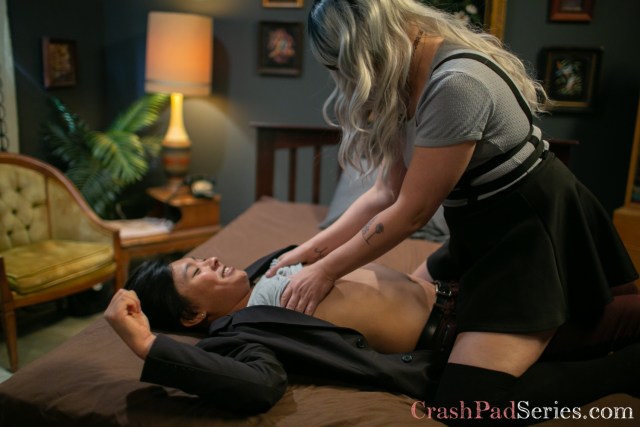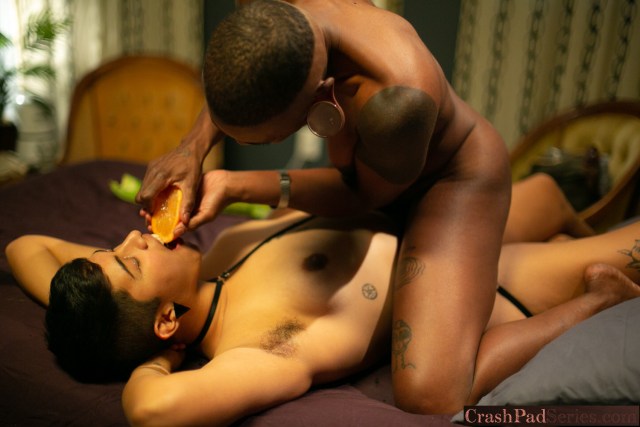Feature image of La Muxer Diosa and Zoie Blackheart in Crash Pad Series episode 281. All of the photographs in this NSFW Sunday are from the Crash Pad. The inclusion of a visual here should not be interpreted as an assertion of the model’s gender identity or sexual orientation. If you’re a photographer or model and think your work would be a good fit for NSFW Sunday, please email carolyn at autostraddle dot com.
Welcome to NSFW Sunday!

Bambi Belle and Denali Winter in Crash Pad Series episode 280
Staying friends with your ex: it’s a choice. If you want to make that choice, here’s how:
“Once you feel enough time and space have passed—I’m not going to put a precise number on it, but will say when thoughts of your ex don’t give you a heart-sickness, rage, or feelings of vengeance, you’re on your way to healing!—the next step to think about is why you want to be friends with this person. A 2017 study in the journal Personal Relationships identified four main reasons why people maintain friendships with exes: security (emotional support, advice, trust), practicality (shared possessions or finances), civility, and unresolved romantic desires.
Unsurprisingly, the relationships of those who tried to be friends because of unresolved romantic desires and civility did not end well. But, staying friends because of security and practical reasons led to more positive outcomes. So, think long and hard about why you want to be close to this person. If your motives are, shall we say, less than ideal, you probably need more time to heal or perhaps you’re not meant to continue your relationship.”

Blair and Megan Reeves in Crash Pad Series episode 279
What does it mean to keep a sluttish house?
We need queer sex ed.
Sex toys are still illegal in Thailand, but activists are trying to change that.
Here’s what your sex dreams mean.
At Oh Joy Sex Toy, Erika Moen reviewed a line of dildos colored like pride flags, calling them “a super reasonably priced, well-made line of toys that are firm enough to fill you up but soft and petite enough that you delicate zones won’t feel pounded.”

Chocolate Chip and Emperatrix in Crash Pad Series episode 278
A relationship that happens to have BDSM in it can also sometimes happen to have abuse in it — and sometimes, when you’re in it, it can be harder to tell what’s what. If you’re wondering about your situation, consider the following:
“Witherspoon identifies one litmus test to differentiate between BDSM and abuse: Can you still function as a citizen in everyday life while leading a BDSM lifestyle? When someone loses their financial independence, their ability to communicate with outsiders, or if their BDSM play harms their body as to make them sick or unable to leave the house—these are all cases of abuse.
According to Witherspoon, BDSM and dominant/submissive relationships should have safeguards built in to create boundaries and prevent abuse from occurring. Common to master/sub relationships are “contracts” that both parties sign, which stipulates how the relationship will be run. Witherspoon advises that couples should allow for constant communication to create clear consent. Most people know about the use of a safe word as an emergency brake to stop roleplay, but Witherspoon also advises for a regular check-in time with both parties, when they’re not in roleplay, to discuss what’s been going well and what hasn’t.”

Barbary Rose and Rion Rhodes in Crash Pad Series episode 277
“For Birkbeck College professor and sexual historian Matt Cook, tracing humanity’s sexual history is a lot like piecing together a complicated, three-dimensional puzzle in which half the pieces aren’t even visible. “There’s a lot of retracing steps, collecting evidence and listening to silences,” he says. “You have to look at what it means when a piece of evidence is not there.”
Recently, Cook used these techniques during his research on queer spaces in 19th century Birmingham, England, where he was able to uncover a series of queer underground cultures and networks that surrounded the cramped, back-to-back houses of the largely straight, working-class neighborhood. To figure this out, he focused heavily on physical spaces, diving deep into the architectural and decorative layouts of people’s homes and bedrooms. When combined with population data, autobiographies, memoirs, oral histories and courtroom records from the time period, these physical spaces told the story of a very crowded area with little privacy, something he says was likely responsible for creating a “vibrant public sex culture” that took place in parks and alleyways (a hypothesis he confirmed using judicial records from the time period).”



That sluttish house essay was great! I’ve harbored a secret affection for the word “sluttish” ever since I came across it in a Shakespeare sonnet freshman yr of college. I remember very little of my theater education, but “b’smeared with sluttish time” is one of those phrases that’s stuck with me for years.
I love and fully embrace my sluttish house and my sluttish ways. Fantastic article.
I was disappointed by the “Is Marriage Obsolete?” article when I read it. I thought it was going to be something more in depth and big picture, not about the author’s personal feelings about her marriage. By the end, it came across as very “smug married” to me